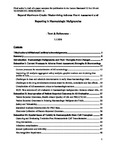Beyond maximum grade: modernising the assessment and reporting of adverse events in haematological malignancies
| dc.contributor.author | Thanarajasingam, G | |
| dc.contributor.author | Minasian, LM | |
| dc.contributor.author | Baron, F | |
| dc.contributor.author | Cavalli, F | |
| dc.contributor.author | De Claro, RA | |
| dc.contributor.author | Dueck, AC | |
| dc.contributor.author | El-Galaly, TC | |
| dc.contributor.author | Everest, N | |
| dc.contributor.author | Geissler, J | |
| dc.contributor.author | Gisselbrecht, C | |
| dc.contributor.author | Gribben, J | |
| dc.contributor.author | Horowitz, M | |
| dc.contributor.author | Ivy, SP | |
| dc.contributor.author | Jacobson, CA | |
| dc.contributor.author | Keating, A | |
| dc.contributor.author | Kluetz, PG | |
| dc.contributor.author | Krauss, A | |
| dc.contributor.author | Kwong, YL | |
| dc.contributor.author | Little, RF | |
| dc.contributor.author | Mahon, F-X | |
| dc.contributor.author | Matasar, MJ | |
| dc.contributor.author | Mateos, M-V | |
| dc.contributor.author | McCullough, K | |
| dc.contributor.author | Miller, RS | |
| dc.contributor.author | Mohty, M | |
| dc.contributor.author | Moreau, P | |
| dc.contributor.author | Morton, LM | |
| dc.contributor.author | Nagai, S | |
| dc.contributor.author | Rule, Simon | |
| dc.contributor.author | Sloan, J | |
| dc.contributor.author | Sonneveld, P | |
| dc.contributor.author | Thompson, CA | |
| dc.contributor.author | Tzogani, K | |
| dc.contributor.author | van Leeuwen, FE | |
| dc.contributor.author | Velikova, G | |
| dc.contributor.author | Villa, D | |
| dc.contributor.author | Wingard, JR | |
| dc.contributor.author | Wintrich, S | |
| dc.contributor.author | Seymour, JF | |
| dc.contributor.author | Habermann, TM | |
| dc.date.accessioned | 2018-06-26T08:40:38Z | |
| dc.date.available | 2018-06-26T08:40:38Z | |
| dc.date.issued | 2018-11 | |
| dc.identifier.issn | 2352-3026 | |
| dc.identifier.issn | 2352-3026 | |
| dc.identifier.uri | http://hdl.handle.net/10026.1/11742 | |
| dc.description.abstract |
Tremendous progress in treatment and outcomes has been achieved across the whole range of haematological malignancies in the past two decades. Although cure rates for aggressive malignancies have increased, nowhere has progress been more impactful than in the management of typically incurable forms of haematological cancer. Population-based data have shown that 5-year survival for patients with chronic myelogenous and chronic lymphocytic leukaemia, indolent B-cell lymphomas, and multiple myeloma has improved markedly. This improvement is a result of substantial changes in disease management strategies in these malignancies. Several haematological malignancies are now chronic diseases that are treated with continuously administered therapies that have unique side-effects over time. In this Commission, an international panel of clinicians, clinical investigators, methodologists, regulators, and patient advocates representing a broad range of academic and clinical cancer expertise examine adverse events in haematological malignancies. The issues pertaining to assessment of adverse events examined here are relevant to a range of malignancies and have been, to date, underexplored in the context of haematology. The aim of this Commission is to improve toxicity assessment in clinical trials in haematological malignancies by critically examining the current process of adverse event assessment, highlighting the need to incorporate patient-reported outcomes, addressing issues unique to stem-cell transplantation and survivorship, appraising challenges in regulatory approval, and evaluating toxicity in real-world patients. We have identified a range of priority issues in these areas and defined potential solutions to challenges associated with adverse event assessment in the current treatment landscape of haematological malignancies. | |
| dc.format.extent | e563-e598 | |
| dc.format.medium | Print-Electronic | |
| dc.language | en | |
| dc.language.iso | en | |
| dc.publisher | Elsevier BV | |
| dc.subject | Clinical Trials as Topic | |
| dc.subject | Hematologic Neoplasms | |
| dc.subject | Humans | |
| dc.subject | Research Design | |
| dc.subject | Safety | |
| dc.title | Beyond maximum grade: modernising the assessment and reporting of adverse events in haematological malignancies | |
| dc.type | journal-article | |
| dc.type | Journal Article | |
| dc.type | Review | |
| plymouth.author-url | https://www.webofscience.com/api/gateway?GWVersion=2&SrcApp=PARTNER_APP&SrcAuth=LinksAMR&KeyUT=WOS:000448842300016&DestLinkType=FullRecord&DestApp=ALL_WOS&UsrCustomerID=11bb513d99f797142bcfeffcc58ea008 | |
| plymouth.issue | 11 | |
| plymouth.volume | 5 | |
| plymouth.publication-status | Published | |
| plymouth.journal | The Lancet Haematology | |
| dc.identifier.doi | 10.1016/s2352-3026(18)30051-6 | |
| plymouth.organisational-group | /Plymouth | |
| plymouth.organisational-group | /Plymouth/Faculty of Health | |
| plymouth.organisational-group | /Plymouth/Faculty of Health/Peninsula Medical School | |
| plymouth.organisational-group | /Plymouth/REF 2021 Researchers by UoA | |
| plymouth.organisational-group | /Plymouth/REF 2021 Researchers by UoA/UoA01 Clinical Medicine | |
| plymouth.organisational-group | /Plymouth/REF 2021 Researchers by UoA/UoA01 Clinical Medicine/UoA01 Clinical Medicine | |
| plymouth.organisational-group | /Plymouth/Research Groups | |
| plymouth.organisational-group | /Plymouth/Research Groups/Institute of Translational and Stratified Medicine (ITSMED) | |
| plymouth.organisational-group | /Plymouth/Research Groups/Institute of Translational and Stratified Medicine (ITSMED)/CBR | |
| plymouth.organisational-group | /Plymouth/Research Groups/Institute of Translational and Stratified Medicine (ITSMED)/CCT&PS | |
| plymouth.organisational-group | /Plymouth/Users by role | |
| plymouth.organisational-group | /Plymouth/Users by role/Academics | |
| dc.publisher.place | England | |
| dcterms.dateAccepted | 2018-03-29 | |
| dc.rights.embargodate | 2022-1-21 | |
| dc.identifier.eissn | 2352-3026 | |
| dc.rights.embargoperiod | Not known | |
| rioxxterms.versionofrecord | 10.1016/s2352-3026(18)30051-6 | |
| rioxxterms.licenseref.uri | http://www.rioxx.net/licenses/all-rights-reserved | |
| rioxxterms.licenseref.startdate | 2018-11 | |
| rioxxterms.type | Journal Article/Review |


